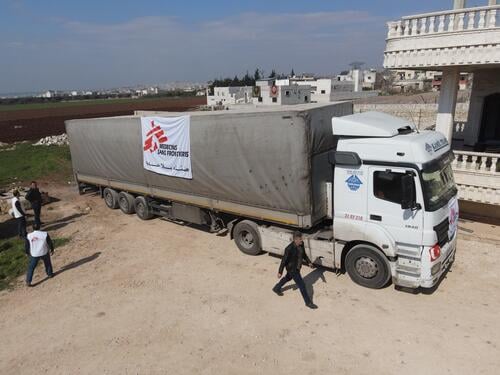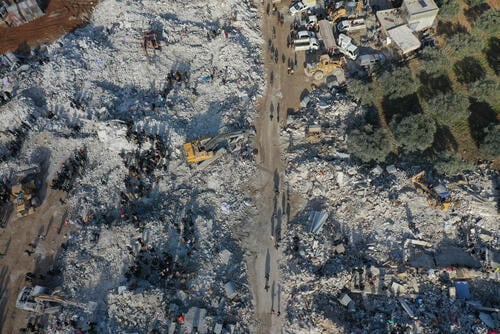- The failure to renew the cross-border resolutions safeguarding access to vital humanitarian aid for northwest Syria impedes the continuity of aid and reinforces the isolation of northwest Syria.
- The consequences of this situation for access to lifesaving aid for the people at large are extremely worrying.
- MSF urges the member countries of the UN Security Council to find a solution with the utmost urgency that guarantees impartial, non-politicised and sustainable humanitarian access.
Amman/Jordan - The failure of the United Nations’ Security Council to renew the cross-border resolution safeguarding access to vital humanitarian aid for northwest Syria is inexcusable. People living in this area lost a vital way to receive aid in an impartial and effective manner.
“The resolution expired a month ago and there is no solution currently in sight. This is simply deplorable. Humanitarian aid has been used as a tool in a political dispute and struggling people in northwest Syria will pay the price for this failure”, says Sebastien Gay, MSF Head of Mission for Syria.
“These people have been suffering for 12 years and live in conditions that no human being should be subjected to. The end of the last remaining impartial cross-border mechanism means things will get even worse for them.”
Humanitarian aid has been used as a tool in a political dispute and struggling people in northwest Syria will pay the price for this failure.Sebastien Gay, MSF Head of Mission for Syria
The cross-border resolution for years enabled UN agencies and their international and national partners to provide humanitarian aid to northwest Syria through the Bab Al-Hawa border crossing in an impartial manner, exempting them from negotiations with bordering Syrian and Turkish authorities.
More than four million people live in this part of Syria and have endured years of suffering as a result of a long, violent conflict, with 2.9 million of them are internally displaced people struggling to find a shelter and have access to clean water, food and healthcare.
The devastating earthquake that struck northwest Syria on 6 February this year has exposed the already-dire humanitarian situation and exacerbated the medical and humanitarian needs. Six months after the devastating earthquakes in Syria, many Syrians are still living with the consequences of the earthquakes, as a high number of people are displaced and struggling with inadequate shelter and insufficient access to essential resources.
We are extremely worried about the consequences of this situation for access to life-saving aid for the population at large.Sebastien Gay, MSF Head of Mission for Syria
The non-renewal impedes the continuity of aid and unavoidably contributes to reinforcing the isolation of northwest Syria amid swelling humanitarian and medical needs by adding more constraints. We fear that agencies and organisations looking to support these vulnerable communities will face additional challenges in providing aid and accessing communities in northwest Syria in an isolated environment.
In addition, the non-renewal of the cross-border mechanism hampers the emergency preparedness of international and national organisations and groups and inhibits the implementation of humanitarian activities and longer-term and sustainable projects, as funding is linked to this mechanism.
“MSF has an established presence in northwest Syria and we will find ways to keep our activities and the level of our support undiminished," says Gay. “But we are extremely worried about the consequences of this situation for access to lifesaving aid for the people at large. Many other agencies and organisations may not have the same capability and may be more affected by the end of the cross-border resolution than we are likely to be.”
The bottom line is that the needs of over four million people have been overlooked, as political negotiations were priorities.Sebastien Gay, MSF Head of Mission for Syria
“The bottom line is that the needs of over four million people have been overlooked, as political negotiations were priorities.”
Humanitarian access to Syria must be efficient, safe, consistent and protected from politicisation, and the cross-border mechanism is an essential component of it.
MSF urges the member countries of the UN Security Council to find a solution with the utmost urgency that guarantees impartial, non-politicised and sustainable humanitarian access. Abandoning northwest Syria to itself would be unconscionable.







